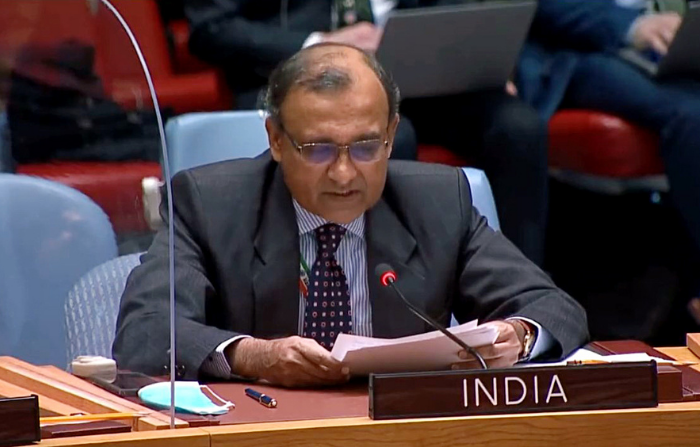- Wednesday, February 26, 2025

By: Shubham Ghosh
INDIA on Monday (13) voted against a draft resolution seeking to set up a formal space for climate change-related discussions at the United Nations Security Council. Russia, a permanent member of the council, also opposed the resolution and its veto saw the resolution hitting a wall.
India and Russia were the only countries to oppose the draft resolution while China, also a permanent member, abstained.
The resolution, sponsored by Ireland and Nigeria, looked to enable the council to take up routine discussions on climate change from the perspective of its effect on peace and conflicts around the world.
ALSO READ: India-US financial talks focus on climate change
Today, India?? voted against a #UNSC draft resolution that attempted to securitize climate action and undermine the hard-won consensual agreements in Glasgow.
Watch Explanation of Vote by Permanent Representative @ambtstirumurti ⤵️ pic.twitter.com/jXMLA7lHnM
— India at UN, NY (@IndiaUNNewYork) December 13, 2021
Currently, the UN platform where all matters related to climate change are discussed in the UN Framework Convention on Climate Change, whose 190-plus member-states meet several times every year, including at a two-week annual conference towards the year end.
Climate change may lead to racial tensions in UK: Experts
One of the aspects of climate change that is less discussed is its impact on international peace and security, a direct effect of food and water shortages and loss of land or livelihood or migration. The sponsors and supporters of the draft resolution argued that this has implications for the UN field missions deployed to maintain peace and security and thus the matter is appropriate to be taken up at the council, the most powerful body of the UN.
Countries such as India, China and Russia have been opposed to the idea from the beginning, saying that the security council’s interventions on climate change will only reduce the importance of the UNFCCC process and give an undue advantage to a handful of developed nations on decision-making in climate change.
India said the UNFCCC has already offered an “elaborate and equitable architecture” with equal voice for every country and adequate recognition of every nation’s “national circumstances”.
“It (UNFCCC process) addresses both immediate needs of the developing and the commitments of the developed (countries). It seeks a balance between mitigation, adaptation, financing, technology, transfer, capacity building etc. In effect, it takes a holistic view of combating climate change which is equitable and fair,” India’s permanent representative to the world body T S Tirumurti said.
“We, therefore, need to ask ourselves what is it that we can collectively do under this draft resolution which we cannot achieve under the UNFCCC process,” Tirumurti said. “Why is it that one needs a UN Security Council resolution to take action on climate change when we have commitments made under UNFCCC towards concrete climate action?
“The honest answer is that there is no real requirement for this resolution except for the purpose of bringing climate change under the ambit of Security Council, and the reason for that is now decisions can be taken without involvement of most developing countries and without recognising consensus,” he added.
“And all this can be done in the name of preserving international peace and security,” he said.
“So let us be clear about the issues. Today, climate change decisions are sought to be taken out of the wider international community represented in the UNFCCC and given instead to the Security Council.
“Ironically, many UNSC members are the main contributors of climate change due to historical emissions. If the Security Council indeed takes over the responsibility on this issue, a few states will then have a free hand in deciding on all climate related issues. This is clearly neither desirable nor acceptable.”
The Indian envoy said the draft resolution could “sow the seeds of discord among the larger UN membership” and called it a “step backward from our collective resolve to combat climate change”.